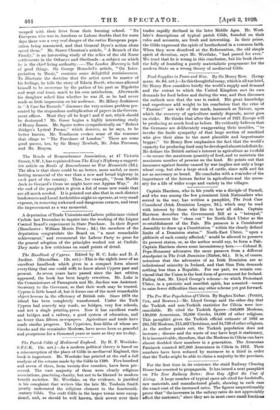Food Supplies in Peace and War. By Sir Henry Row.
(Long- snans. 6s. 6d. net.)—In this thoughtful essay, which is all too brief, Sir Henry Row considers briefly the world's supply and demand and the extent to which the United Kingdom met its own demands for food before and during the war, and then discusses the outlook now that the war is ended. His great knowledge and experience add weight to his conclusion that the cries of " Famine !" are wide of the mark, inasmuch as Nature, upon which the recovery of agriculture mainly depends, never goes on strike. He thinks that after the harvest of 1921 Europe will be producing as much food as before. He evidently believes that the Germans are deliberately exaggerating their troubles, "to invoke the facile sympathy of that large section of mankind who give their alms to the most plausible and importunate beggar." Sir Henry Hew emphasizes the fact that the world's capacity for producing food may. be developed ahnostindefuntely. He defines the British nation's interest in agriculture as twofold —to secure the maximum quantity of food, and to maintain the maximum number of persons on the land. He points out that insurance against famine caused by war implies not only a large wheat crop, but also a large stock of cattle, since milk and fat are as necessary as bread. He concludes with a reminder of the importance of the human factor in agriculture and the neces- sity for a life of wider scope and variety in the villages.


































 Previous page
Previous page